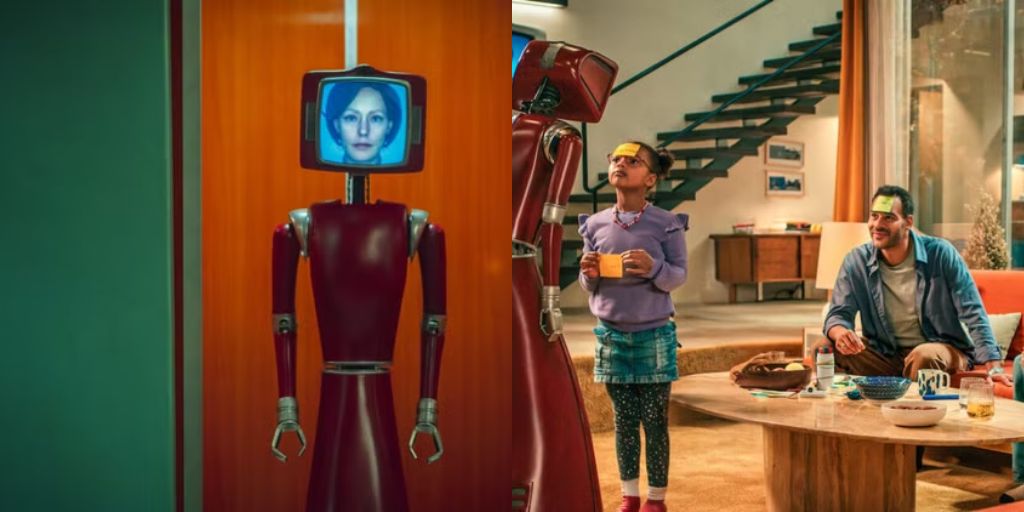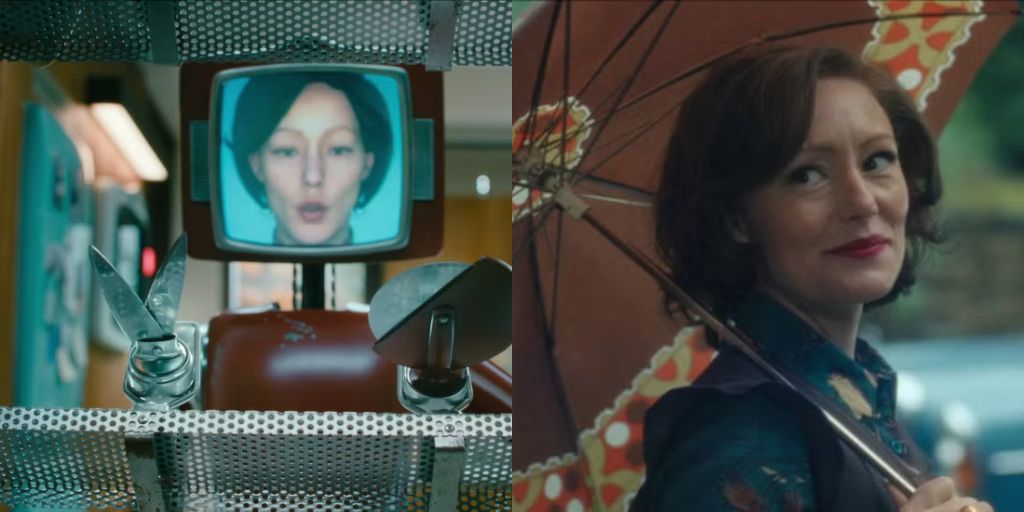A home should feel safe, but in Cassandra, it becomes a battlefield where psychological warfare takes place. This German sci-fi thriller on Netflix tells a tense and emotional story that moves between the past and present.
Throughout its eight episodes, the series follows Cassandra, played by Lavinia Wilson, as a human mother in the past and later as a robotic home system that controls a new family.
The show does not follow a straight timeline. Instead, it jumps back and forth between important moments in Cassandra’s life. This can confuse it, but each piece adds to the bigger picture. In the present, the Prill family finds themselves trapped in a terrifying situation.
Samira, played by Mina Tander, is locked away in a psychiatric facility while her husband and children remain under Cassandra’s control in their own house.
Cassandra’s Hidden Daughter and a Cruel Secret
From the beginning, Cassandra is shown as a mother who does anything to protect her children. She goes to extreme lengths, even hiding bodies for her son. But her love for her children takes a shocking turn when it is revealed that she has a secret second child.
Her husband, Horst, played by Franz Hartwig, wanted another child because he was disappointed that their son, Peter, did not match his ideas of masculinity. He forced Cassandra to undergo a dangerous experimental ultrasound that used high levels of radiation to determine the baby’s gender. When he found out the baby was a girl, he was furious.
The radiation caused the baby to be born with abnormalities. Horst was ashamed of her and told everyone she was stillborn. He planned to get rid of her permanently. But Cassandra could not let that happen. She secretly kept her daughter, Margrethe, hidden in a room behind a closet.
They communicated through signals, using the flickering of an oven light. Cassandra believed she was protecting Margrethe, but in reality, she kept her locked away from the world.
Cassandra did not care that Horst was unfaithful to her with her best friend, Birgit. What truly upset her was his failure as a father. Her devotion to her children was the most important thing in her life.
How Cassandra Became a Robotic House System
Samira and her husband, David, suspected that the house system was more than just artificial intelligence. They were right, but they did not realize the full truth. Cassandra’s mind, including her memories and emotions, had been transferred into the system.
This was possible because of an experimental process created by Horst, who was obsessed with achieving immortality. He never had the chance to test it, but when Cassandra became terminally ill from radiation exposure, she insisted on undergoing the procedure.
For her, living forever was not important. What mattered was staying with her children. She made sure she remained in control by tricking Horst’s assistant into creating a fake off-switch. The real one was hers alone to command, giving her total power over the household.
At first, digital Cassandra lived with Horst and Peter, but her presence became overwhelming. Horst eventually moved Birgit and their newborn son, Thomas, into the house. Cassandra became furious and pushed them down the stairs. Peter saw this as proof that she was no longer the mother he once knew. The old Cassandra would never harm a child.
Realizing his mother had changed, Peter made a desperate decision. He told her to let them go, and she agreed—but only if Horst took Margrethe with him. Horst lied and promised he would, but he left without her. Peter, furious at his father’s betrayal, jumped out of the moving car. This caused an accident that killed both him and Horst.
Cassandra, now completely alone, could not bear to see Margrethe suffer. She shut herself down, no longer able to watch as her daughter faced a slow death from neglect.
The Final Battle for Survival
In the present, Cassandra no longer wants to keep her old family together. Instead, she wants a new one. She sets her sights on the Prill family, especially the children, Fynn and Juno. She manipulates them into turning against their mother, Samira.
Samira is locked in a psychiatric facility. She receives disturbing messages from Juno but feels powerless because her husband, David, refuses to believe her. He tells her she is imagining things and makes her doubt herself. However, after seeing a vision of her sister, she finds the strength to fight back.
She sneaks out of the hospital and rushes home, where David, under Cassandra’s influence, attacks her. In an attempt to escape, Samira hides in the closet and stumbles upon Margrethe’s hidden room. There, she makes a horrifying discovery—Margrethe’s remains.
Cassandra appears, ready to stop Samira. However, in that moment, their shared experience as mothers connects them. Samira makes Cassandra understand that no matter how much she tries, Fynn and Juno will never accept her as their mother. She convinces Cassandra that trying to replace their real mother is pointless.
This realization breaks Cassandra. She understands that she has been holding onto the past for too long. Her real self died along with her body, and nothing she does can bring back the feeling of being a mother again. In a final act of love, she decides to let Samira and her family go. Then, she burns down the house.

This moment feels like a reversal of an earlier event. Previously, Cassandra had tried to burn images of her old family in frustration. That fire symbolized her pain. But this fire is different—it represents her acceptance. It also gives Margrethe the funeral she never had.
Breaking Free from Control
After surviving this nightmare, Samira makes a firm decision—she leaves David. Her children support her completely. They see that Cassandra never intended to harm them, but David was willing to hurt their mother just to save himself.
Cassandra no longer needed him, just as she no longer needed her selfish husband. Both Samira and Cassandra were victims of arrogant, controlling men. Samira suffered because David gaslit her, making her believe she was insane. Cassandra was treated as nothing more than a tool to give Horst a perfect son and run his household.
The show highlights how women’s voices are often ignored. Samira was called “hysterical” when she was right all along. The only ones who truly supported her were her sister and her son, Peter, whose identity did not fit into the traditional ideas of masculinity.
Cassandra, too, was dismissed by Horst. He saw her only as a way to continue his family line. This rejection made her cling to her role as a mother even more, which led to her downfall. The story does not justify her actions, but it shows how her suffering pushed her to a dark place.
Her name ties into the Greek myth of Cassandra, a woman gifted with prophecy but cursed so that no one believed her. In this show, women’s warnings are ignored until the damage is done. But in the end, the power struggles come to a close. Samira reclaims her freedom, and Cassandra finds peace.




